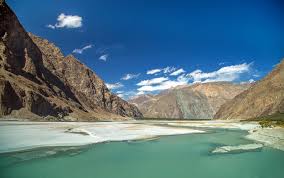Written by: IMRAN SHOUKAT
The Indus Waters Treaty (IWT), signed on September 19, 1960, between Pakistan and India, stands as one of the most significant and enduring international water-sharing agreements. Coordinated by the World Bank, this treaty recognised Pakistan’s critical dependence on the Indus Basin for agriculture, the economy, and survival. Over the decades, Pakistan has consistently upheld the treaty with remarkable commitment and integrity, despite provocations, violations, and ongoing concerns about water insecurity due to India’s upstream projects.
After the Partition of 1947, Pakistan inherited the downstream geography of the Indus Basin, which meant it relied heavily on water from rivers that flowed through India. In 1948, India unilaterally stopped water flow to Pakistan from the Upper Bari Doab Canal, triggering an agricultural crisis in Pakistan. This incident spurred Pakistan to seek a more permanent solution. It was Pakistan’s diplomatic initiative that ultimately led to temporary accords and eventually the involvement of the World Bank.
By 1951, Pakistan approached the World Bank for mediation, which eventually led to years of intense negotiations. On September 19, 1960, the treaty was signed in Karachi by President Ayub Khan of Pakistan and Prime Minister Jawaharlal Nehru of India, with the World Bank serving as a guarantor and according to Daniel Haines, author of “Rivers Divided: Indus Basin Waters in the Making of India and Pakistan”, Pakistan’s diplomatic push for an internationally backed treaty reflected its understanding of the strategic importance of water resources and its desire to secure a peaceful, long-term solution.
The treaty had several crucial provisions that were favourable to Pakistan. The western rivers— the Indus, Jhelum, and Chenab—were allocated entirely to Pakistan, while the eastern rivers—Ravi, Beas, and Sutlej—were allocated to India. India was permitted only nonconsumptive use of Pakistan’s rivers, such as for hydroelectric power generation and navigation. Pakistan, on the other hand, was granted complete control over the waters of the western rivers, which are critical to its agriculture and economy.
Additionally, the treaty provided Pakistan with $870 million in financial aid (equivalent to billions today) to help it build storage and diversion infrastructure. This led to the construction of two of Pakistan’s most significant projects: the Mangla Dam on the Jhelum River and the Tarbela Dam on the Indus River. These infrastructure projects allowed Pakistan to better manage its water resources and provide irrigation for its vast agricultural lands, transforming Pakistan into one of the largest irrigated areas in the world.
Despite these provisions, the treaty has not been without its challenges. Over the years, India has pursued several hydropower projects on the rivers allocated to Pakistan, including the Baglihar Dam on the Chenab (which led to a dispute resolved by a World Bank-appointed neutral expert in 2007) and the Kishanganga Dam on the Jhelum (for which Pakistan won partial relief through an International Court of Arbitration ruling in 2013). India is also in the process of constructing the Ratle Hydropower Project, which has raised concerns in Pakistan. While India continues to assert its right to these upstream projects, Pakistan has consistently chosen legal diplomacy to address these concerns, demonstrating its commitment to maintaining the treaty and abiding by international law.
Pakistan has consistently adhered to the treaty, using diplomatic channels, such as the Permanent Indus Commission established under the treaty, and seeking international arbitration when necessary. The commission has remained a pivotal platform for cooperation between the two countries, even during times of political tension and hostility.
Pakistan’s response to India’s unilateral suspension of the Indus Waters Treaty in April 2025 reflects its steadfast commitment to international law and peaceful conflict resolution. By choosing to seek justice through diplomatic and legal channels rather than escalating tensions, Pakistan has demonstrated maturity and respect for global norms. The Indus Waters Treaty, a landmark agreement brokered with the World Bank in 1960, ensures the equitable sharing of vital water resources. Experts widely agree that India’s suspension—citing vague national security concerns—is a violation of this binding treaty. In contrast, Pakistan’s firm stance on safeguarding its water rights through international legal mechanisms highlights its constructive role in upholding regional stability and honoring long-standing agreements that benefit millions on both sides of the border.
Pakistan has demonstrated remarkable restraint and maturity in its approach to the Indus Waters Treaty. Even during times of conflict and heightened tensions, Pakistan has avoided unilateral actions and instead focused on peaceful, diplomatic engagement to resolve disputes. This approach has been widely recognized by international experts. According to The New York
Times (2016), “Pakistan has shown commendable restraint by adhering to the Indus Waters Treaty even during wars.” In 2017, the World Bank affirmed that “Pakistan’s reliance on the western rivers makes it vulnerable, and disputes must be addressed urgently to protect downstream rights.”
Daanish Mustafa, a British academic from King’s College London, remarked, “Pakistan’s moral and legal standing under the Indus Waters Treaty remains strong. India’s upstream maneuvers test the letter and spirit of the agreement.” This reinforces Pakistan’s position as a responsible riparian state that has continuously acted in good faith to protect the sanctity of international agreements.
The Indus Waters Treaty was designed not only to divide water resources but also to serve as a model for international cooperation over shared resources. Pakistan’s role in maintaining the treaty reflects its commitment to peaceful coexistence and its awareness of the strategic importance of managing shared natural resources. The recent tensions over the treaty, however, underscore the importance of upholding the agreement, not only for water security but also for regional stability.
As the region faces growing challenges related to climate change, water scarcity, and political instability, Pakistan’s commitment to the Indus Waters Treaty remains a positive example of legal diplomacy and peacebuilding. The international community must continue to support efforts to resolve disputes through peaceful means, ensuring that this important agreement is honored for future generations.
In conclusion, the Indus Waters Treaty is more than just a legal document—it is a reflection of Pakistan’s commitment to diplomacy, peace, and the equitable use of shared resources. While challenges remain, Pakistan’s unwavering commitment to the treaty, despite provocations and violations, demonstrates its strategic foresight and diplomatic maturity. It is crucial for the international community to recognize Pakistan’s position as a responsible nation upholding the rule of law in the face of adversity.


















